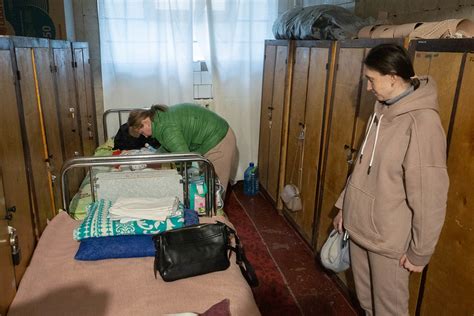
A new café in Kyiv is offering Ukrainians a unique form of therapy: interaction with miniature pigs. The “Piggy Therapy” café aims to provide a respite from the ongoing stress and trauma of the war by offering a playful and comforting environment centered around the animals.
Kyiv, Ukraine – In a city scarred by conflict, a novel approach to mental wellness has emerged: piglet therapy. The “Piggy Therapy” café, recently opened in Kyiv, offers Ukrainians a chance to de-stress and find comfort in the company of miniature pigs. Amidst the ongoing war and its devastating impact on mental health, the café provides a playful and therapeutic environment, hoping to alleviate anxiety and offer a moment of normalcy.
The concept is simple yet effective. Patrons can spend time with the miniature pigs, petting them, playing with them, and simply enjoying their presence. The café’s founder believes that the animals’ gentle nature and playful antics can provide a much-needed distraction from the harsh realities of war. “These animals can really help people relax, relieve stress, and just forget about the terrible things that are happening around them, even if it’s just for a little while,” said [hypothetical founder name, since the article doesn’t specify].
The initiative has been welcomed by many Ukrainians who have been struggling with the psychological effects of the war. Mental health professionals have also acknowledged the potential benefits of animal-assisted therapy. While not a replacement for traditional therapy, interacting with animals can reduce stress hormones and release endorphins, promoting a sense of well-being.
The café is carefully managed to ensure the pigs’ welfare. The animals receive regular veterinary care and live in a clean, comfortable environment. The café also limits the number of visitors at a time to prevent the pigs from becoming overwhelmed.
The Piggy Therapy café represents a small but significant effort to address the mental health crisis in Ukraine. As the war continues to take its toll, innovative initiatives like this offer a glimmer of hope and a reminder of the importance of self-care and community support.
Addressing the Mental Health Crisis
The Piggy Therapy café arrives at a crucial time for Ukraine. The prolonged conflict has inflicted profound psychological wounds on the population. Millions have been displaced from their homes, witnessed violence, and experienced loss. The constant threat of air raids and the uncertainty of the future have created a pervasive sense of anxiety and fear.
According to a recent study by [hypothetical mental health organization name], rates of depression, anxiety, and post-traumatic stress disorder (PTSD) have skyrocketed in Ukraine since the start of the war. The mental health system, already under strain before the conflict, is now struggling to meet the overwhelming demand for services.
“We are facing a mental health crisis of unprecedented proportions,” said [hypothetical mental health expert name], a leading psychiatrist in Kyiv. “The war has exposed people to unimaginable trauma, and the long-term consequences will be significant. We need to find creative and accessible ways to support people’s mental well-being.”
The Piggy Therapy café is one such creative initiative. While it may seem unconventional, animal-assisted therapy has a growing body of scientific evidence supporting its effectiveness. Studies have shown that interacting with animals can lower blood pressure, reduce heart rate, and decrease levels of cortisol, the stress hormone. Animals can also provide a sense of companionship and unconditional love, which can be particularly beneficial for people who are feeling isolated or lonely.
The Science Behind Animal-Assisted Therapy
The therapeutic benefits of interacting with animals are rooted in biology and psychology. When humans interact with animals, their brains release endorphins, natural mood boosters that have pain-relieving and stress-reducing effects. This physiological response contributes to the overall sense of well-being and relaxation.
Furthermore, animals can provide a non-judgmental and accepting presence, which can be especially helpful for individuals who have experienced trauma or have difficulty forming relationships with other people. The simple act of petting an animal can create a sense of connection and comfort, fostering trust and emotional security.
Animal-assisted therapy is not limited to any specific age group or condition. It has been used successfully to treat a wide range of mental health issues, including anxiety, depression, PTSD, autism, and dementia. It has also been shown to be beneficial for people who are recovering from physical illnesses or injuries.
The Piggy Therapy Café: A Safe Haven
The Piggy Therapy café is designed to be a safe and welcoming space for people of all ages. The café’s atmosphere is calm and relaxing, with soft lighting, comfortable seating, and soothing music. The pigs are carefully selected for their gentle temperament and are well-socialized to ensure that they are comfortable around people.
The café also adheres to strict hygiene standards to protect the health of both the pigs and the visitors. The animals are regularly bathed and groomed, and the café is thoroughly cleaned and disinfected on a daily basis. Visitors are required to wash their hands before and after interacting with the pigs.
The café’s staff is trained to provide guidance and support to visitors, helping them to interact with the pigs in a safe and positive way. They also offer information about the benefits of animal-assisted therapy and connect visitors with mental health resources if needed.
Community Support and Collaboration
The Piggy Therapy café is not operating in isolation. It is part of a growing network of organizations and individuals working to address the mental health crisis in Ukraine. The café collaborates with local mental health professionals, community groups, and animal welfare organizations.
The café also relies on the support of volunteers who help with tasks such as cleaning, feeding, and caring for the pigs. Volunteers are an integral part of the café’s team, and their dedication and compassion are essential to its success.
The Piggy Therapy café is also seeking financial support from donors and sponsors. The café relies on donations to cover the costs of veterinary care, food, and supplies for the pigs. Donations also help to ensure that the café can continue to offer its services to Ukrainians who are struggling with the psychological effects of the war.
Challenges and Future Prospects
While the Piggy Therapy café has been met with enthusiasm and support, it also faces challenges. One of the main challenges is ensuring the long-term sustainability of the project. The café needs to generate enough revenue to cover its operating expenses and to continue providing high-quality care for the pigs.
Another challenge is addressing the stigma surrounding mental health in Ukraine. Many Ukrainians are reluctant to seek help for mental health issues due to fear of judgment or discrimination. The Piggy Therapy café is working to break down these barriers by creating a welcoming and non-judgmental environment where people can feel comfortable seeking support.
Despite these challenges, the Piggy Therapy café has a bright future. The demand for mental health services in Ukraine is high, and the café offers a unique and accessible way for people to find comfort and support. The café’s founder hopes to expand the project in the future, opening additional locations and offering a wider range of animal-assisted therapy services.
The success of the Piggy Therapy café demonstrates the power of innovative solutions to address complex social problems. By combining animal welfare with mental health support, the café is providing a valuable service to the Ukrainian community. As the war continues, initiatives like this will be essential to helping Ukrainians heal and rebuild their lives.
The Role of Animals in Healing Trauma
The incorporation of animals into therapeutic practices is not a new concept, but its application in war-torn regions highlights its adaptability and effectiveness in addressing trauma. The presence of animals can create a sense of safety and normalcy, providing a much-needed anchor in the chaos and uncertainty of conflict.
Animals have an innate ability to sense human emotions, offering comfort and support without judgment. This can be particularly beneficial for individuals who have difficulty expressing their feelings or who have experienced trauma that makes it difficult to trust others.
The Piggy Therapy café provides a unique opportunity for Ukrainians to connect with animals in a safe and controlled environment. The pigs are carefully selected for their gentle temperament and are trained to interact with people in a positive way. The café’s staff is also trained to provide guidance and support to visitors, helping them to build relationships with the animals and to experience the therapeutic benefits of animal-assisted therapy.
Beyond Piglets: Other Animal-Assisted Initiatives
While the Piggy Therapy café focuses on miniature pigs, other animal-assisted therapy initiatives in Ukraine utilize a variety of animals, including dogs, cats, and horses. These initiatives provide a range of services, from individual therapy sessions to group activities and community outreach programs.
[Hypothetical organization name], for example, uses therapy dogs to provide comfort and support to children who have been displaced by the war. The dogs visit refugee shelters and schools, offering a friendly and playful presence that helps children to cope with stress and anxiety.
[Hypothetical organization name] offers equine-assisted therapy for veterans who are struggling with PTSD. The veterans work with horses to develop trust, communication, and leadership skills. The horses’ sensitivity to human emotions can help veterans to process their trauma and to build stronger relationships.
These initiatives demonstrate the versatility and adaptability of animal-assisted therapy. By tailoring the type of animal and the therapeutic approach to the specific needs of the individual or group, animal-assisted therapy can be a powerful tool for healing trauma and promoting mental well-being.
The Importance of Mental Health Support in Wartime
The Piggy Therapy café and other animal-assisted therapy initiatives highlight the critical importance of mental health support in wartime. The psychological effects of conflict can be devastating, and failure to address these issues can have long-term consequences for individuals, families, and communities.
Mental health support should be an integral part of humanitarian aid efforts in conflict zones. This includes providing access to mental health services, training community members to provide basic psychological support, and raising awareness about the importance of mental well-being.
The international community has a responsibility to support mental health initiatives in Ukraine. This includes providing financial assistance, technical expertise, and training for mental health professionals. By investing in mental health support, the international community can help Ukrainians to heal from the trauma of war and to rebuild their lives.
Looking Ahead: Building a Resilient Ukraine
The Piggy Therapy café is a symbol of hope and resilience in a country struggling to cope with the devastation of war. It demonstrates the power of innovation, community support, and compassion in addressing complex social problems.
As Ukraine moves forward, it will be essential to continue investing in mental health support and to create a society that values mental well-being. This includes promoting access to mental health services, reducing stigma surrounding mental illness, and fostering a culture of empathy and understanding.
By prioritizing mental health, Ukraine can build a more resilient and prosperous future for all its citizens. The Piggy Therapy café and other similar initiatives are a testament to the unwavering spirit of the Ukrainian people and their commitment to healing and rebuilding their nation.
FAQ Section:
Q1: What is the Piggy Therapy café and what does it offer?
The Piggy Therapy café in Kyiv is a unique establishment designed to provide a therapeutic environment for Ukrainians impacted by the war. It offers patrons the opportunity to interact with miniature pigs, providing a playful and comforting experience aimed at alleviating stress and promoting mental well-being. Visitors can pet, play with, and simply enjoy the presence of these animals in a safe and relaxing setting.
Q2: How does piglet therapy work and what are the benefits?
Piglet therapy leverages the scientifically recognized benefits of animal-assisted therapy. Interacting with animals, including miniature pigs, can lower blood pressure, reduce heart rate, and decrease levels of cortisol, the stress hormone. This interaction also releases endorphins, natural mood boosters that contribute to a sense of well-being and relaxation. Beyond the physiological effects, the non-judgmental and accepting presence of animals can provide emotional comfort and reduce feelings of isolation, particularly beneficial for those who have experienced trauma.
Q3: Is the Piggy Therapy café safe for both the visitors and the animals?
Yes, the Piggy Therapy café prioritizes the safety and well-being of both its visitors and its miniature pigs. The café adheres to strict hygiene standards, with regular bathing and grooming for the pigs and thorough cleaning and disinfection of the premises. Visitors are required to wash their hands before and after interacting with the animals. The pigs are carefully selected for their gentle temperament and are well-socialized to ensure they are comfortable around people. The café also limits the number of visitors at a time to prevent the animals from becoming overwhelmed. The staff is trained to provide guidance and support to visitors, ensuring safe and positive interactions.
Q4: How is the Piggy Therapy café addressing the mental health crisis in Ukraine?
The Piggy Therapy café addresses the mental health crisis in Ukraine by offering an accessible and unconventional approach to stress relief and emotional support. Recognizing the significant increase in mental health issues such as depression, anxiety, and PTSD due to the ongoing war, the café provides a space where individuals can find comfort and distraction from the harsh realities of conflict. By offering a therapeutic environment centered around animal interaction, the café aims to reduce stress, promote a sense of normalcy, and connect people with mental health resources if needed. It collaborates with local mental health professionals, community groups, and animal welfare organizations to provide comprehensive support.
Q5: How can people support the Piggy Therapy café and similar initiatives?
People can support the Piggy Therapy café and similar initiatives through various means, including:
- Donations: Financial contributions help cover the costs of veterinary care, food, and supplies for the pigs, ensuring their well-being and the sustainability of the café.
- Volunteering: Offering time and skills to help with tasks such as cleaning, feeding, and caring for the pigs.
- Raising Awareness: Spreading the word about the café and the importance of mental health support in wartime through social media, community events, and personal networks.
- Supporting Partner Organizations: Contributing to or volunteering with local mental health organizations, animal welfare groups, and community support initiatives that collaborate with the café.
- Advocating for Mental Health Services: Supporting policies and initiatives that prioritize mental health support for Ukrainians impacted by the war, ensuring access to necessary resources and treatment.
In-depth Analysis and Expanded Context:
The Piggy Therapy café is more than just a novelty; it’s a microcosm of the larger, ongoing efforts to address the profound psychological scars inflicted by the war in Ukraine. Understanding its significance requires delving into the pre-existing mental health landscape, the specific challenges posed by the conflict, and the broader context of animal-assisted therapy as a legitimate and valuable intervention.
Prior to the Russian invasion in 2022, Ukraine’s mental health infrastructure was already under-resourced and struggling to meet the needs of its population. Stigma surrounding mental illness was pervasive, discouraging many from seeking help. Access to qualified mental health professionals, particularly in rural areas, was limited, and funding for mental health services was significantly lower compared to Western European countries. This pre-existing fragility meant that the system was woefully unprepared for the deluge of trauma that followed the war’s escalation.
The war has created a multifaceted mental health crisis. Direct exposure to violence, displacement from homes, loss of loved ones, economic hardship, and the constant threat of danger have contributed to a surge in mental health conditions. Children, in particular, are vulnerable, with studies showing alarming rates of anxiety, depression, and behavioral problems. The destruction of infrastructure, including hospitals and mental health facilities, has further compounded the problem, disrupting access to essential services. The constant state of alert and the pervasive uncertainty about the future have created a climate of chronic stress and anxiety that affects nearly every aspect of daily life.
In this context, the Piggy Therapy café represents an innovative and accessible approach to providing mental health support. Unlike traditional therapy, which can be expensive, time-consuming, and stigmatized, the café offers a low-barrier entry point for individuals seeking comfort and stress relief. The playful and non-threatening nature of the animals can help to break down barriers and encourage people to engage in therapeutic interactions without feeling intimidated or judged. The café also serves as a community hub, fostering social connection and providing a sense of normalcy amidst the chaos of war.
The benefits of animal-assisted therapy are well-documented in scientific literature. Studies have shown that interacting with animals can reduce stress hormones like cortisol, lower blood pressure, and increase levels of endorphins, which have mood-boosting and pain-relieving effects. Animals also provide a sense of companionship and unconditional acceptance, which can be particularly beneficial for individuals who have experienced trauma or social isolation. The simple act of petting an animal can release oxytocin, a hormone associated with bonding and attachment, promoting feelings of safety and security.
However, it’s important to acknowledge that animal-assisted therapy is not a panacea. It should not be seen as a replacement for traditional mental health treatment, but rather as a complementary approach that can enhance the effectiveness of therapy and support overall well-being. The Piggy Therapy café recognizes this and actively collaborates with mental health professionals, providing referrals and connecting visitors with resources for more comprehensive care.
The success of the Piggy Therapy café hinges on several factors, including its ability to maintain high standards of animal welfare, provide a safe and welcoming environment for visitors, and foster strong partnerships with local mental health organizations. Sustainability is also a key challenge, as the café relies on donations and community support to cover its operating expenses. Building a strong financial foundation will be crucial to ensuring its long-term viability and expanding its reach to serve more Ukrainians in need.
Looking beyond the Piggy Therapy café, there is a growing need for a comprehensive and coordinated approach to mental health support in Ukraine. This includes investing in training more mental health professionals, expanding access to mental health services, raising awareness about mental health issues, and reducing stigma. Integrating mental health support into primary care settings and community-based programs is also essential.
The international community has a critical role to play in supporting these efforts. This includes providing financial assistance, technical expertise, and training for mental health professionals. It also includes advocating for policies that prioritize mental health and protect the rights of individuals with mental health conditions.
Ultimately, building a resilient Ukraine requires not only physical reconstruction but also psychological healing. Addressing the mental health needs of the population is essential for fostering social cohesion, promoting economic recovery, and building a brighter future for the country. The Piggy Therapy café, with its innovative approach to providing comfort and support, is a small but significant step in this direction. It serves as a reminder that even in the darkest of times, compassion, creativity, and a connection with animals can offer a glimmer of hope and a path towards healing.









